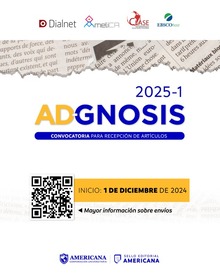The Ristretter ecosystem: between trust and monetization. A case study of the Argentine company
DOI:
https://doi.org/10.21803/adgnosis.14.16.924Keywords:
companies, ecosystems, trust, monetizationAbstract
Introduction: This study focuses on the analysis of the monetization/trust binomial within business relationships. In the current context of high competitiveness and digitalization, the dynamics between economic value and relational value become crucial for understanding the sustainability and legitimacy of corporate connections. Objective: The general objective is to analyze how the balance between monetization and trust manifests in business relationships. Specifically, the study seeks to conceptualize and describe networking structures in order to determine whether transactional and speculative logics prevail over the human value of relationships. Additionally, it examines the case of the Argentine entrepreneur Claudio De Stéfano, with the purpose of interpreting and describing the strategic actions implemented to achieve a balance between
both components of the binomial. Methodology: The research adopts an interpretative and descriptive approach, grounded in an ethnographic analysis. Interviews and participant observation were conducted with the entrepreneur during his daily activities, along with interactions with members of the business ecosystem and participation in various events over a period of one and a half years. Results: The study identifies a process of organizational transformation driven by the professionalization of business structures. The entrepreneur relies on a group of managers to oversee relationships and high value-added products, while delegating commercial tasks and the identification of new business opportunities to other actors. Conclusions: The findings suggest that achieving a balance between monetization and trust depends on organizations’ capacity to distribute responsibilities, professionalize relationships, and sustain a relational vision of social capital. This research contributes to the field of business anthropology by providing insights into the tensions between economic and symbolic value within corporate networks.
Downloads
References
Alinsaoui, R., Shehadeh, A., Beris, E., & Kaldis, P. (2024). Clusters in Business: A Review of Successful International Models, Factors and Characteristics. Open Journal of Business and Management, 12, 886-917. https://doi.org/10.4236/ojbm.2024.122047
Banco Interamericano de Desarrollo.Kantis, H., Fernández, C. y Menéndez, C. (2021). ¿Cómo serán los futuros ecosistemas de emprendimiento en la pospandemia?: tendencias y escenarios en América Latina.
http://dx.doi.org/10.18235/0003449
Bourdieu, P. (1986). The forms of capital. En J. Richardson (Ed.), Handbook of Theory and Research for the Sociology of Education (pp. 241-258). Greenwood.
Brandenburger, A. y Nalebuff, B. (1996). Coopetition. Crown Business.
Cavalli, P. e Ivickas Magallan, M. (2024). Emprender con propósito. El caso de Claudio Destéfano y el ecosistema Ristretter. Serie Documentos de Trabajo Universidad del CEMA, Nº 870, Universidad del CEMA. https://ucema.edu.ar/sites/default/files/2024-06/dt870_0.pdf
Cegarra-Navarro, J. G., Briones-Peñalver, A. J. y Ros-Sánchez, M. (2005). La confianza como elemento esencial para la mejora de la cooperación entre empresas: un estudio empírico en pymes. Cuadernos de Administración, 18(30). https://revistas.javeriana.edu.co/index.php/cuadernos_admon/article/view/5245
Eslava-Zapata, R., Sánchez-Castillo, V. y Chacón-Guerrero, E. (2024). Experiencia del consumidor: análisis de la tendencia de la investigación. Bibliotecas. Anales de investigación, 20(2), 1-13. http://revistas.bnjm.sld.cu/index.php/BAI/article/view/817/680
Fukuyama, F. (1996). Confianza. Atlantida.
Geertz, C. (1973). La interpretación de las culturas. Gedisa.
Goleman, D. (1995). La Inteligencia emocional. Kairós.
Goleman, D. y Boyatzis, R. (6 de febrero de 2017). Emotional Intelligence Has 12 Elements. Which Do You Need to Work On? Harvard Business Review.
Ivickas Magallan, M. y Cavalli, P. (2024). La Confianza como activo: Claudio Destéfano y el ecosistema Ristretter. Un caso de éxito argentino. Revista De Ciencias Empresariales Y Sociales, 11(8), 1-26. https://publicacionescientificas.uces.edu.ar/index.php/empresarialesysociales/article/view/1780/1878
Jones, G. y George, J. (2014). Administración Contemporánea. McGraw-Hill.
Kantis, H. y Angelelli, P. (2020). Los ecosistemas de emprendimiento de América Latina y el Caribe frente al COVID-19: Impactos, necesidades y recomendaciones. Banco interamericano de Desarrollo.
http://dx.doi.org/10.18235/0002331
Kantis, H., Fernández, C. y Menéndez, C. (2021). ¿Cómo serán los futuros ecosistemas de emprendimiento en la pospandemia?: tendencias y escenarios en América Latina. Banco Interamericano de Desarrollo.
Lockward Dargam, A. M. (2011). El rol de la confianza en las organizaciones a través de los distintos enfoques o pensamientos en la Administración. Ciencia y Sociedad, 36, julio-septiembre.
10.22206/cys.2011.v36i3.pp464-502
Mankiw, G. (2012). Principios de Economía. Harvard University Press.
Montoro, M. (2000). El éxito de la cooperación internacional en investigación y desarrollo: un análisis de los factores organizativos. Jornada sobre Alianzas Estratégicas y Cooperación Empresarial, Universidad Rey Juan Carlos I, Madrid, España.
Pitizaca Guamán, F. y Soria Orbe, M. (2024). Los clústeres empresariales, una opción de mejora para la productividad, competitividad y la rentabilidad de las PYMES en Ecuador; un análisis descriptivo. Ciencia Latina Revista Científica Multidisciplinar, 8(5), septiembre-octubre. https://doi.org/10.37811/cl_rcm.v8i5.13945
Porter, M. E. (1998). Clusters and the New Economics of Competition. Harvard Business Review, 76, 77-90. Project Management Institute. (2021). A guide to the project management body of knowledge (PMBOK® Guide).
Ramírez-Carvajal, D., Carvajal-Henao, M., Toro-Cardona, A. y Grisales-Aguirre, A. (2021). Competencias en networking: perspectivas desde una revisión literaria. Revista de Ingenierías Interfaces, 4(1), 103-127.
Robbins, S y Coulter, M. (2014). Administración. Prentice-Hall.
Rogers, E. (1962). Diffusion of Innovations. Free Press.
Sabater, R y Montes, A. (2001). La fase inicial del proceso de cooperación empresarial: propuesta de un modelo. XI Congreso de la Asociación Científica de Economía y Dirección de la Empresa (ACEDE), Zaragoza, España.
Schumpeter, J. (1942). Capitalism, Socialism and Democracy. Routledge.
Smith, M., Van Oosten, E. y Boyatzis, R. (12 de junio 2020). The Best Managers Balance Analytical and Emotional Intelligence. Harvard Business Review.
Terlato, A. (2019). Estrategia y Decisiones en ambientes VICA. Implicancias de este entorno para las empresas. Serie Documentos de Trabajo UCEMA, Nº 699. https://ucema.edu.ar/publicaciones/download/documentos/699.pdf
Vargas Rocha, F., de Esteban Curiel, J. y Moura Cunha, L. (2020). La relación entre la confianza y el compromiso y sus efectos en la lealtad de marca. Revista de Métodos Cuantitativos para la Economía y la Empresa, 29. https://doi.org/10.46661/revmetodoscuanteconempresa.3839
Weber, M. (1969). Economía y sociedad. FCE.

Downloads
Published
Issue
Section
License
Copyright (c) 2025 AD-GNOSIS

This work is licensed under a Creative Commons Attribution-NonCommercial-NoDerivatives 4.0 International License.





